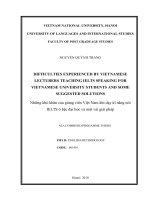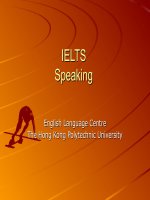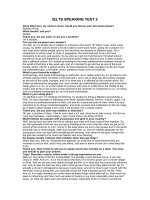Demo IELTS speaking
Bạn đang xem bản rút gọn của tài liệu. Xem và tải ngay bản đầy đủ của tài liệu tại đây (471.04 KB, 37 trang )
Warm up
• [A] An answer to the question:
“How often do you go to the cinema?”
“Once a month”
• [B] A response focused on language:
“What's your favorite color?”
“Well, to be quite honest, I don't really have an actual favorite color but I guess that if I were buying clothes, then I'd usually
go for something like blue or gray – you know, kind of dull colors, nothing too bright.”
The Marking System
· Fluency and Coherence
· Lexical Resource (Vocabulary)
· Grammatical Range and
Accuracy
· Pronunciation
• [B] A response focused on language:
“What's your favorite color?”
“Well, to be quite honest, I don't really have an actual favorite color but I guess that if I were buying clothes, then I'd usually
go for something like blue or gray – you know, kind of dull colors, nothing too bright.”
• Red: Redundant languages => Fluency and coherence
• Yellow: Uncommon vocabulary => Lexical resources
• Green: Linking phrases => Fluency and coherence
• Blue : Complex sentence structures => Grammatical Range and Accuracy
Part 1
Summary
(1)
Experiences
(2) Objects
(3) People/living things
(4) Places
(5) Media-related topics
(6) Others (anything that doesn't fit into the 5 categories above)
Types of question of part 1
2 main types
• Wh- questions: What, where, when, how, why, who, which.
• Yes-no questions: Do, Does, is, are, etc
Wh- question
How often do you go to the cinema?
Where do you usually buy your clothes?
When do you listen to music?
AT what time of day do you usually read?
Who do you spend your weekends with?
It depends
Step 1: Opening phrases
Well to be honest ...
Actually to be fair ...
In actual fact ...
Well in truth ...
Well in all fairness ...
In fact, in all honesty ...
Step 2: Depend phrases
... I think I would have to say that it is really depends.
... I suppose I would have to maintain that it kind of depends really.
... I imagine that it would depend on the situation.
... I guess my answer would be determined by different conditions.
Step 3: Linking phrases
Like for instance ...
Like more specifically ...
You know like, to be exact ...
More precisely like ...
Like, to be more direct ...
Step 4: Conditional grammar structure
If (situation A) ... then I will most likely ...
If (situation A) ... then it’s quite possible that I will ...
If (situation A) ... then as a consequence I will probably ...
If (situation A) ... then I guess it’s quite likely that I will ...
Step 5: compare linking phrase
• Whereas in contrast ...
• Whereas on the other hand ...
• Though, at the same time ...
• While, oppositely ...
Step 6: Conditional grammar structure
If (situation B) ... then it’s more likely that I’ll ...
If (situation B) ... then it’s almost certain that I will ...
If (situation B) ... then I will almost always ....
If (situation B) ... then I will most certainly ...
So the whole 6 steps becomes
Well in all fairness, I imagine that it would depend on the situation. Like for instance, if
(situation A) ... then I will most likely ... so/because/in fact ...
Whereas on the other hand, If (situation B) ... then it’s almost certain that I will ...
• If you follow the example structure, make sure that you choose two situations that are very different. It is easier to
contrast two clearly different situations.
• Make sure that you use ―if and ―will for both situations. This is a fairly complex grammar structure but it is easy to
construct accurately.
Brainstorming
• …..
Writing
• Aspirin
• | ˈasp(ə)rɪn |
• digital camera
• | ˌdɪdʒɪtlˈkamərə |
• elastic band
• | ɪˈlastɪk band |









